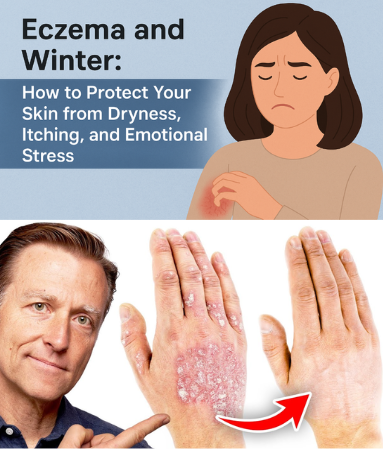
Living with eczema is more than just managing dry, inflamed patches—it’s an emotional challenge, too. Seasonal changes, especially the transition from warm summers to cold winters, can make the condition worse. Between biting winds, low humidity, and indoor heating, your skin can easily lose moisture, leaving it cracked, dehydrated, and prone to painful flare-ups. But the good news is—you don’t have to suffer silently. With the right skincare routine and lifestyle tweaks, you can enjoy the winter without letting eczema steal your comfort.
What Triggers Eczema During Winter?
Winter is often the toughest season for people with eczema. The sudden drop in humidity and exposure to harsh winds weaken your skin barrier, making flare-ups more frequent. Common triggers include:
- Loss of skin moisture: Cold winds and low humidity increase transepidermal water loss, leaving skin dry and vulnerable.
- Excess clothing layers: Multiple heavy layers may trap sweat, irritate sensitive skin, and restrict airflow.
- Dry indoor air: Heating systems remove natural moisture from the environment, worsening dehydration.
- Harsh exposure: Wool, detergents, and strong soaps strip away protective oils, leaving skin inflamed and itchy.
1. Use a Fragrance-Free Body Lotion with Barrier-Strengthening Properties
Moisturization is non-negotiable for eczema-prone skin. Opt for body lotions that are fragrance-free and enriched with madecassoside, colloidal oatmeal, and gamma-linoleic acid. These ingredients not only restore hydration but also repair the skin barrier, calming redness and irritation. Applying lotion right after a shower locks in moisture and keeps your skin nourished throughout the day.
2. Switch to Barrier Creams for the Face
Facial skin is thinner and more sensitive, which makes it especially vulnerable during winter. Instead of using body lotions on your face, choose lightweight creams formulated for eczema-prone skin. Look for shea butter and ceramides (I, III, VI)—powerful ingredients that strengthen the skin’s defense system and reduce transepidermal water loss. Apply these creams twice daily to maintain hydration and resilience.
3. Skip the Long, Hot Baths
While hot showers feel soothing on cold days, they can be disastrous for eczema. Hot water strips away protective lipids and weakens your skin barrier, leaving it vulnerable to flare-ups. Instead, bathe in lukewarm water for 10–15 minutes, and always pat your skin dry with a soft towel instead of rubbing. Immediately apply moisturizer while your skin is still damp to trap hydration.
Video : 7 Ways to Prevent Eczema Flare-Ups
4. Avoid Harsh Soaps and Surfactants
Many soaps, shampoos, and detergents contain sulfates, parabens, and artificial fragrances that irritate eczema-prone skin. These harsh ingredients strip away natural oils, making your skin dry and inflamed. Replace them with gentle, sulfate-free, and fragrance-free cleansers designed for sensitive skin. Your skin will thank you for the extra kindness.
5. Add Moisture to Your Environment with a Humidifier
Indoor heating is one of the main culprits behind winter eczema. It sucks moisture from the air, leaving your skin parched. A humidifier helps balance indoor humidity and prevents your skin from drying out. For best results, clean the humidifier every 2–3 days to prevent bacterial buildup, which could otherwise trigger flare-ups.
6. Wear Skin-Friendly Fabrics
Wool sweaters may feel cozy, but they can be rough on eczema-prone skin. Instead, layer breathable cotton clothing under wool or heavy fabrics. Cotton allows airflow, prevents overheating, and reduces friction against irritated skin. By creating this barrier, you’ll reduce flare-ups and stay comfortable throughout the day.
Hydration: Your Best Defense Against Winter Eczema
The secret weapon for fighting winter eczema is consistent hydration. Reapply moisturizers two to three times a day, especially after washing your hands or bathing. Hydration doesn’t just mean external care—drinking enough water is just as important to keep your skin healthy from within.
Don’t Forget Sunscreen—Even in Winter
Many people assume sunscreen is only necessary during summer. But harmful UVA and UVB rays still penetrate through clouds and windows in winter. This can trigger eczema flare-ups and worsen skin sensitivity. Choose a mineral sunscreen with zinc oxide or titanium dioxide, as these are less likely to irritate sensitive skin.
Video : The #1 Best Remedy for Eczema
Final Thoughts
Eczema can be tough to live with, especially in winter, but with the right strategies, you can manage symptoms and protect your skin barrier. Gentle moisturization, barrier creams, humidifiers, and skin-friendly fabrics are your allies in the fight against flare-ups. By avoiding harsh ingredients and staying hydrated, you’ll give your skin the nourishment it needs to stay soft, calm, and resilient.
Winter doesn’t have to feel like a battle for your skin. With the right care, you can step outside, breathe in the crisp air, and still feel comfortable in your own skin.


